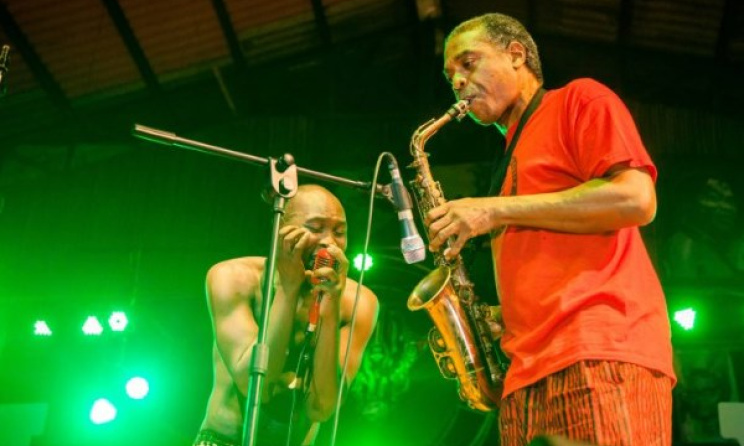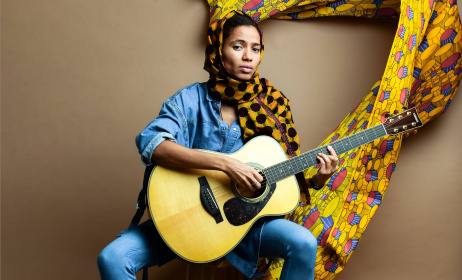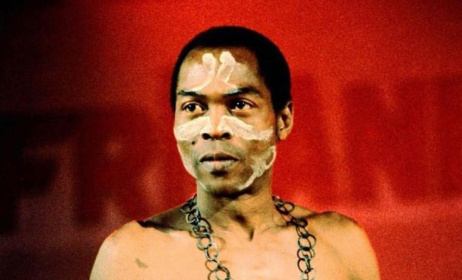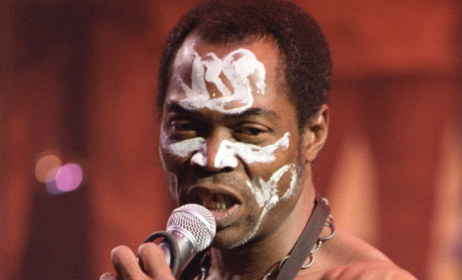Felabration: The search for a new Fela continues
By IfeOluwa Nihinlola
The Afrika Shrine in Lagos was filled on the night of what would have been Fela Kuti’s 78th birthday.
 Femi ans Seun Kuti performing at Felabration. Photo: Ayo Akinwande
Femi ans Seun Kuti performing at Felabration. Photo: Ayo Akinwande
Outside the gates, where the festival spirit was very alive, a group of men moved around playing gangan and omele for guests to dance to. Inside the shrine, many jostled for seats, ordering drinks, and an eyo masquerade impersonator was serenading the guests.
It was October 15, the sixth night of Felabration 2016, themed ‘Everybody Say Yeah Yeah’. The space between the crowd and the roof was hazy — the combined effect of the stage lights and lit blunts blowing smoke into the air.
Seun Kuti was going to perform, but first a lineup of artists prefaced his act, starting properly with the Beninese Gangbé Brass Band. Femi Kuti brought the distracted crowd to attention as he accompanied the band to ‘Yoruba Ronu’. The crowd noticed, raising their fists as he played.
The acts that followed — Waje, Bez, Nneka — were a diverse trio, paying homage to Fela in their different ways. Of the three, Nneka’s beautifully plaintive voice — forced to close to screaming due to an underperforming sound system — was closest to Fela’s protest spirit as she sang, “Where did we go wrong?” But it was Seun Olota, joined by Akorede Sax, who brought the first explicitly Fela-like performance: Afrobeat, dancing back-up singers jiggling their butts to the crowd, and a full syncopating band.
Akorede Sax sang Fela’s ‘Zombie,’ stomping and twisting as he moved up and down the stage, and the crowd watched on with subdued interest.
Fela’s protest was more than the sound and words of his music. His was a life of protest, an iconoclast whose very existence became synonymous with a resistance to oppressive power. When the MCs — Emperor Jagz (formerly Jesse Jagz), Seriki, Vector, and others — took to the stage and started to rap, the crowd was roused. They joined in the chorus because this is what they connect with. Same happened when the DJ took over between acts and the anchor Omo Baba, a comedian, led the crowd in singing various hits. Olisa Adibua, who puffed on a cigar as he introduced the younger MCs, later joined Omo Baba. Hedonism, not protest, is the spirit of the times.
Seun Kuti and the Egypt 80 band finally took to the stage in the early hours of the morning, and here the crowd got as close as it would to Fela. He sang, played the saxophone, and writhed on stage like an earthworm touched by salt. A blunt was thrown to him and he lit it after thanking whoever rolled it. Taking a long pause, he delivered a lecture on the state of the country, trying to wake up the crowd to the injustice we face.
Sometimes the crowd hailed him and danced along. Other times they watched, content to gaze on the chest glistening with sweat and his tight leopard print trousers, reflections of the one whose birthday they had come to celebrate.
As Seun started ‘Higher Consciousness,’ two ladies by the stage connected the ends of their cigarettes, passing on the light. Seun later called out the king of Afrobeat, Femi Kuti, and the audience came alive again, roused by the latter's saxophone.
In Femi’s instrument lies the purest distillate of Fela’s music: a sound almost descending into chaos but with enough form to push a crowd to ecstasy. And as the night of Fela’s birthday passed, the wait for this age’s Fela continues. Maybe the question of conscious music is never going to be answered in this generation, at least not in the way many want it to be.
The country is due for a rapper who asks for something other than sex, a Fela who can spit on 16s. Someone to connect the blunt force of his skill with Fela’s fire, but then Nneka has tried to rouse the consciousness of her compatriots without enough attention.
As long as the people have Fela’s image, his sons, and his Shrine, they’ll continue this search. Yet whatever happens — whether they find the new age Fela or not — the show will go on.


































Comments
Log in or register to post comments